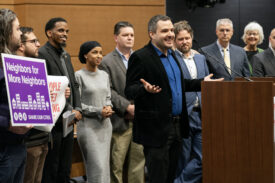Taxes are the DNA of the economy: invisible, cryptic, and awesomely powerful. And unfortunately, the tax system penalizes many of the activities northwesterners want more of—such as work, entrepreneurship, and investment, while encouraging activities that northwesterners want less of—such as sprawl and the waste of resources.
Tax shifting-an innovation implemented in a dozen European countries—means reducing taxes on paychecks and profits and replacing the revenue, dollar for dollar, with taxes on pollution, resource consumption, sprawl, and traffic. Phased in over years, tax shifts actually boost prosperity and enhance environmental and human health at once.
Sightline Institute’s 1998 book Tax Shift—available in a full-text download—is a comprehensive guide to the possibilities of tax shifting in the Northwest. Here are a few examples:
- Tax pollution, untax enterprise and work
Each year, northwesterners send billions of pounds of harmful substances into the region’s air, water, and land—many of these end up in living things. Pollution taxes could raise enough money to eliminate most business taxes. And the infrastructure for pollution taxes is already sturdy enough to begin a decades-long transition. - Tax resource depletion, untax income
Governments could trim income and sales taxes and make up the difference in revenue from levies on water, hydropower, timber, and minerals-activities that cause a disproportionate share of ecological degradation.Washington, for example—whose reliance on sales tax makes its system highly regressive—could cut its state and local sales taxes by one-third if it taxed natural resource-depleting activities. - Tax sprawl, untax buildings
In every Northwest city, vacant lots and rundown, low-rise buildings promote urban decay and push people out to the suburbs. Shifting the property tax partially or entirely off buildings and onto land would create a powerful incentive for investment in city and town centers and adjacent neighborhoods-revitalizing downtowns and reducing sprawl. - Tax congestion, untax commerce
Governments build roads, but then don’t charge drivers for their use. Lacking any price mechanism, urban drivers pay for road use with their time, by waiting in traffic. The solution? Transportation experts widely agree that “congestion pricing“—tolls that rise during rush hour—is the best answer. - Spread clean technologies with “feebates”
“Feebates” are point-of-purchase incentives that charge a fee for less-efficient products and given a rebate for more-efficient ones. Best of all they create a snowball effect, systematically nudging the market toward cleaner designs.







